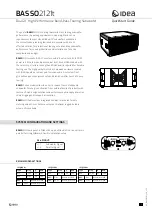
7
5.
PHASE: Sets the subwoofer to be in-phase or 180° out-of-phase with the signal
being sent to the satellite and center channel speakers. See the
SETUP section
below for details on how to use this control.
6.
FREQUENCY: Use this knob to set the variable crossover frequency from 40 ~ 250
Hz. See the
SETUP section below for details on how to use this control.
7.
VOLUME: Use this knob to set the overall volume level of the subwoofer in relation
to the satellite and center channel speakers. See the
SETUP section below for
details on how to use this control.
8.
LOW LEVEL INPUT: Stereo line level RCA inputs for connecting to the normal line
level, stereo preamplifier outputs on an amplifier.
9.
LFE INPUT: Mono line level RCA input for connecting to a dedicated subwoofer
output on an amplifier. This is the preferred method of connecting the subwoofer.
10.
HIGH LEVEL INPUT: Stereo speaker level 5-way binding posts for connecting to the
speaker level outputs on an amplifier. This is the least favored method of
connecting the subwoofer.
SPEAKER BREAK-IN
In the same way that a new car requires a break-in period before it can be safely operated
at high engine RPMs, speakers require a break-in period before they can be safely operated
at maximum volume levels. Proper break-in ensures that the moving parts of the speaker
(the cone and cone suspension) are allowed to flex and soften, losing the initial stiffness
and allowing the speaker to move through its full intended range. After the break-in
period, the subwoofer will produce richer and fatter sounding lows without any hint of
distortion.
The best way to break-in speakers is simply to play normal music or watch movies at
moderate volume levels. The amount of time required for speaker break-in varies based on
the operating environment, but is typically in the area of 50~80 hours. It will take a bit
longer in a cold or dry environment and a little less time in a warm or humid environment.
Note that the break-in period does not have to be continuous.




































